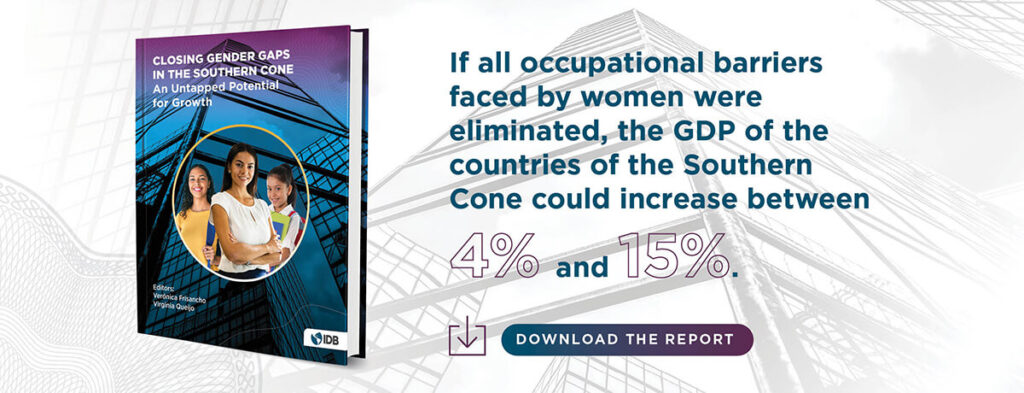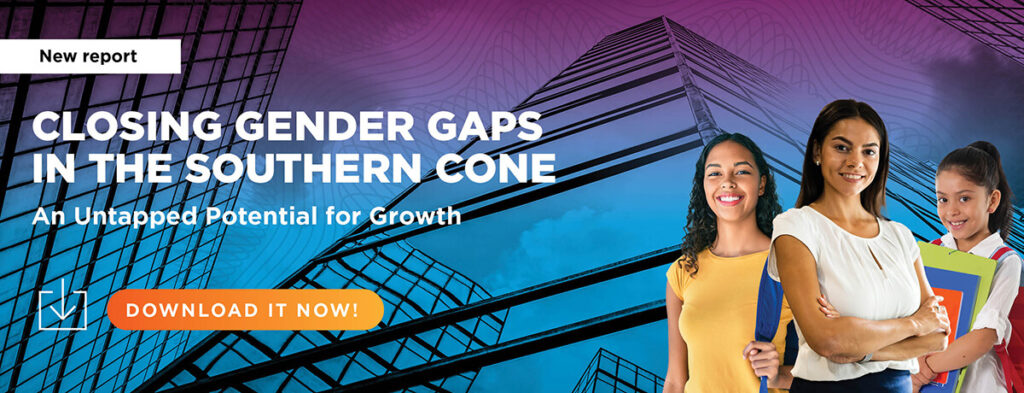
As the COVID-19 pandemic struck the Southern Cone countries of Latin America, gender equality gaps, already far too wide, suffered real setbacks, reflecting the fragility of the gains made in recent years. Women took on most of the additional workload at home due to the closure of schools and care facilities, and their participation in the labor market declined sharply. Its recovery since has been slow.
Policymakers in the Southern Cone countries—Argentina, Brazil, Chile, Paraguay, and Uruguay—need to urgently enact programs and policies that reduce gender inequality and give women an opportunity to reach their full potential in the labor market and beyond. Now more than ever improving gender equality is essential as those countries focus on sustained and inclusive growth in the pandemic’s recovery phase.
As a contribution to that cause, the IDB has launched a volume of studies that provides evidence useful for designing policies that can effectively tackle gender disparities. Entitled Closing Gender Gaps in the Southern Cone: An Untapped Potential for Growth, the collection includes studies that dig into the sources of gender gaps in the labor market, covering diverse challenges ranging from disparities in the education system to biased daily mobility patterns. Other studies analyze the economic consequences of gender inequalities, such as their impact on aggregate productivity, and the effect of different policies or phenomena, such as globalization, on gender parity.
Gender Gaps are Costly
The aggregate costs resulting from gender gaps in the labor market, according to this research, are high. Eliminating occupational barriers such as wage discrimination, gaps in human capital accumulation (skills and abilities), and gender-biased social norms could yield considerable aggregate output gains in Southern Cone countries, ranging between 4% and 15%, depending on the country. Removing barriers faced by women and various ethnic groups in Brazil could achieve gains as high as 30% of GDP.

Key to removing those barriers are policies that tackle human capital accumulation gaps early on and promote women’s labor market participation and access to high-skill occupations. Technical fields are one area that is ripe for improvement. Research in this volume, for example, finds that enrollment in education for engineering and technology, as opposed to humanities, arts or social science increases men’s earnings and employment. It does not, however, do the same for women. This does not seem to be because women prefer jobs with different characteristics such as more flexibility, better work-life balance, or a shorter commuting time. Rather, it seems that women in technology and engineering may be subject to more labor market discrimination relative to women in other fields.
Different Factors Affecting Gender Gaps
The volume also finds that factors other than human capital formation can contribute to gender inequalities in the labor market. Different mobility patterns, for example, may restrict access to jobs for women. Because of their household and family responsibilities, women tend to take more frequent trips than men, travel more outside of rush hour, and use more public transportation. This leads to relatively higher costs of transportation which limits women access to employment opportunities, especially for those belonging to disadvantaged populations. Thus, deliberately considering women in urban planning and transportation policies could help alleviate some of these problems.
Another study looks at the role that foreign direct investment (FDI) can play in reducing gender disparities in the labor market. The results show that local firms with more workers with multinational experience have smaller gender gaps in earnings. The effects are small in terms of their economic significance, however, suggesting that countries should not rely on FDI as a significant source of improvement in gender equality.
Formalization Programs Disproportionately Attract Women
By contrast, gender-neutral interventions targeting micro and small enterprises could significantly affect labor market gender gaps. Reducing the bureaucratic and tax costs of registering a business increases formalization rates, especially among women. Indeed, as the literature shows, women value the benefits of formalization more than men, and they seek more social security for their families. Thus, understanding the motivations of women in moving to formal labor can inform the design of future programs.
Achieving gender equality is one of the priorities of the IDB’s Vision 2025. A focus on gender is critical in helping the region’s countries promote sustainable and inclusive growth. A good start is implementing programs and public policies that reduce gender inequality and give women the opportunity to reach their full potential.



Leave a Reply